June 05, 2025 | 13:51
Science
Education
Events
YSU hosts event celebrating German Language Day
Yerevan State University recently hosted an event titled "German Language Day in Armenia" at the university’s Academic Council Session Hall. The event featured an exhibition of publications from German publishing houses in the lobby, along with student presentations delivered in fluent German during the main program.
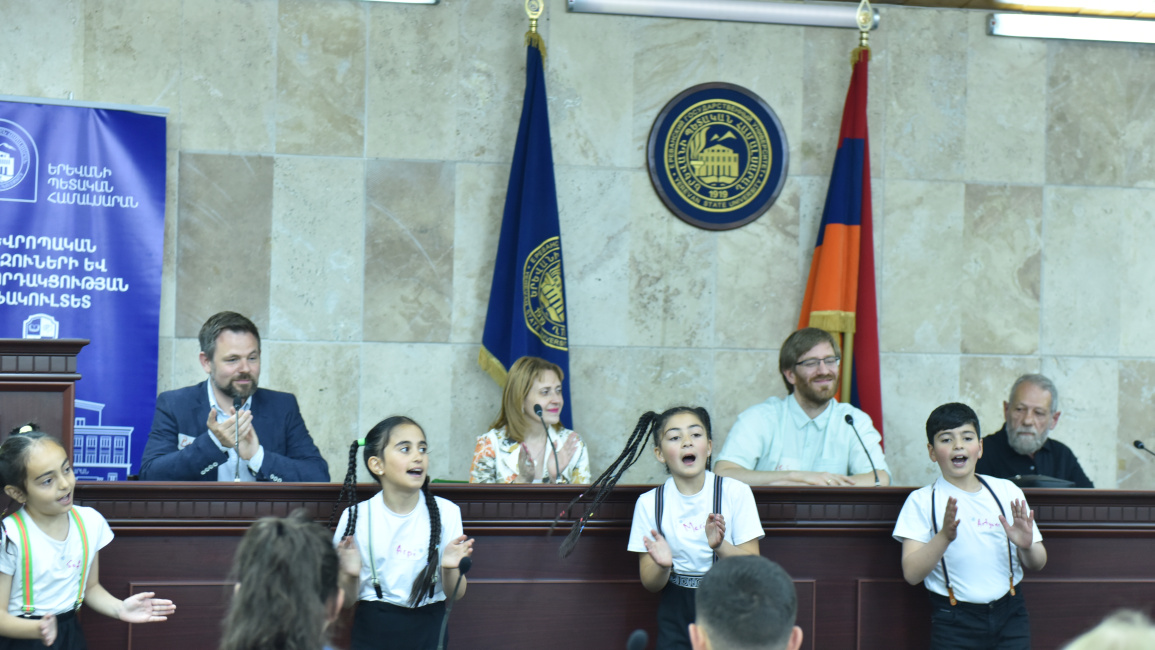
The event was held through the joint initiative of YSU, the Goethe-Institut, the Central Agency for Schools Abroad (ZfA), and the German Academic Exchange Service (DAAD). It brought together more than 120 participants—including teachers, lecturers, students, and pupils—from various provinces of Armenia, including Shirak, Kotayk, Ararat, Gegharkunik, Tavush, and Aragatsotn (from cities such as Gyumri, Artik, Sardarapat, Chambarak, Armavir, and Dilijan).
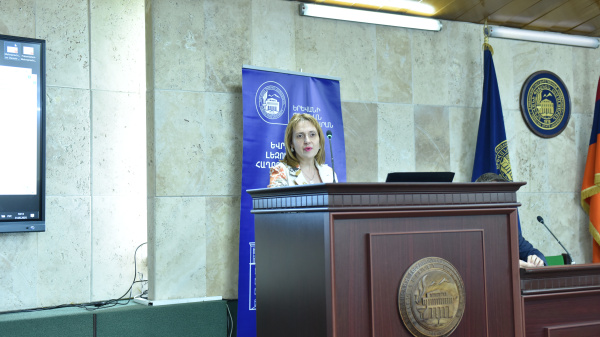
Opening remarks were delivered by M. Yaghubyan, Deputy Dean of YSU Faculty of European Languages and Communication; Y. Tauschwitz, a German language teaching expert in Armenia from the Goethe-Institut; L. Sargsyan, lecturer at the Chair of German Philology; and V. Soghomonyan, co-founder of Participatory School Foundation.
In his address, M. Yaghubyan emphasized the importance of Germany and the German language in Armenia, stating: "German is more than just a means of communication. It is the language of science, technology, philosophy, and art. In Armenia, German is increasingly playing a greater role in education, opening numerous doors for our youth both locally and internationally."
Y. Tauschwitz highlighted the large number of attendees, noting this as evidence of strong motivation and interest among German language learners. This, he noted, creates opportunities for the exchange of knowledge, experience, and the building of networks.
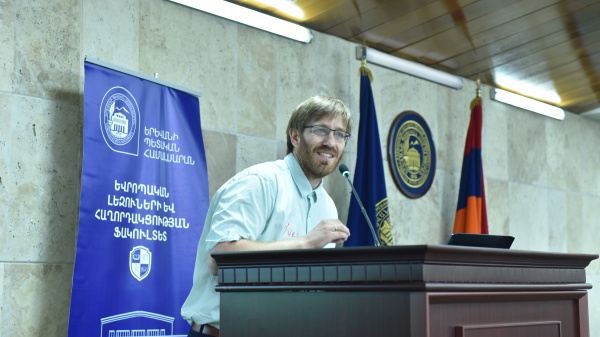
"I am deeply impressed by the energy with which German is taught and learned in Armenia. We are encouraged by the participants’ enthusiasm, their use of innovative methods, and their admiration for German culture," he added.
V. Soghomonyan, co-founder of the Participatory School Foundation, underlined the value of such events for bringing together German language specialists and learners, while providing valuable opportunities for the exchange of experience—especially for schools in provinces. He emphasized the foundation’s role in supporting teacher training, addressing challenges in the education system, and fostering democratic and political culture. According to him, this also contributes to learner-centered teaching and the development of essential skills.
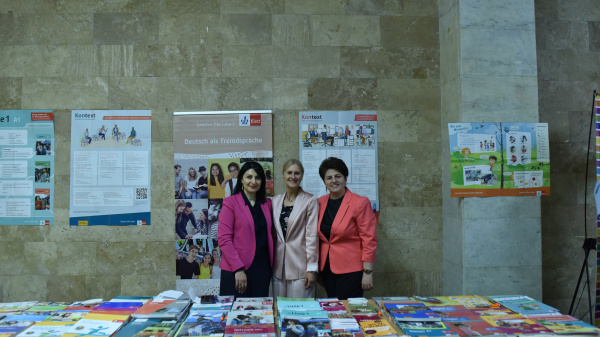
In the interview with us, G. Savoyan, Head of the Chair of German Philology at YSU Faculty of European Languages and Communication, stressed the importance of organizing such events and noted that the primary goal is to bring together teachers, lecturers, pupils, and students who are involved in the teaching and learning of German. YSU expresses its commitment to addressing the challenges faced by educators and supporting them, with the aim of enhancing teaching quality. "One of our key objectives is to promote the spread of the German language throughout Armenia, and we are determined to do everything possible to ensure effective teaching using innovative methods," Savoyan said.
Representatives from several well-known German publishing houses—including Ernst Klett Sprachen, Cornelsen, and Hueber—as well as from the Andranik publishing house and the publishing house of the Participatory School Foundation, took part in the event. Each had its own booth presenting successful textbooks for German teaching. Jennifer Swanda, an expert from Ernst Klett Sprachen, conducted a special training session for lecturers of YSU German Philology Chair. The session introduced modern teaching methodologies for B2/C1 level instruction, incorporating the use of artificial intelligence.
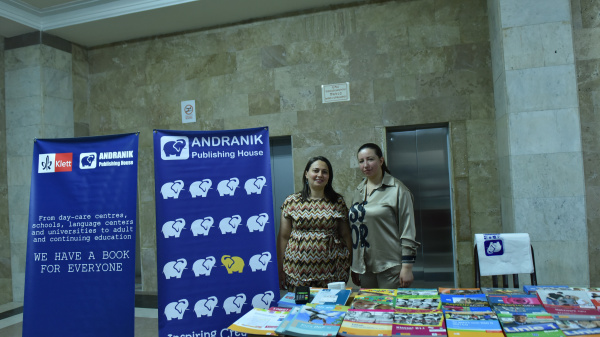
The Chair of German Philology maintains close cooperation with the Ernst Klett publishing house and Participatory School Foundation. Through this collaboration, teaching materials have been adapted for general education school grades 3, 6, 7, 8, 9, 11, and 12.
"We aim to encourage teachers of German, helping them see that Germany is invested in their efforts. We provide teaching tools that can be directly applied in the educational process. All the workshops held today serve this very purpose," stated M. Navasardyan, lecturer at the Chair of German Philology.
Participants of the event received training in modern teaching methods suitable for both novice and experienced educators.
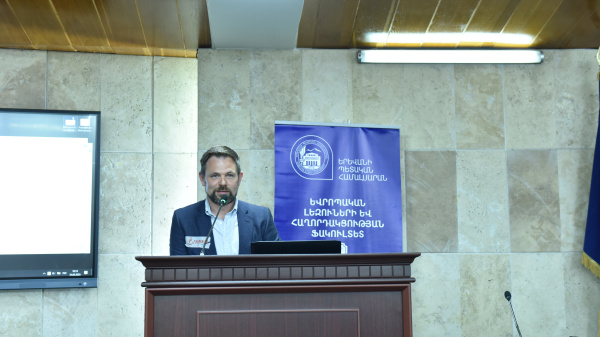
According to B. Speth, Armenia Coordinator for the Central Agency for Schools Abroad, "German Language Day in Armenia" was an excellent opportunity for teachers and lecturers to learn about innovative methodologies, expand professional networks, and gain motivation.
"Above all, this is an important occasion to publicly acknowledge that we exist, that we have a presence in Armenia, and that Germany—as a country—has much to offer to Armenia. Official statistics show that the number of German learners in Armenia nearly matches those studying French. This means we should not hide; on the contrary, we must be visible," he emphasized.

